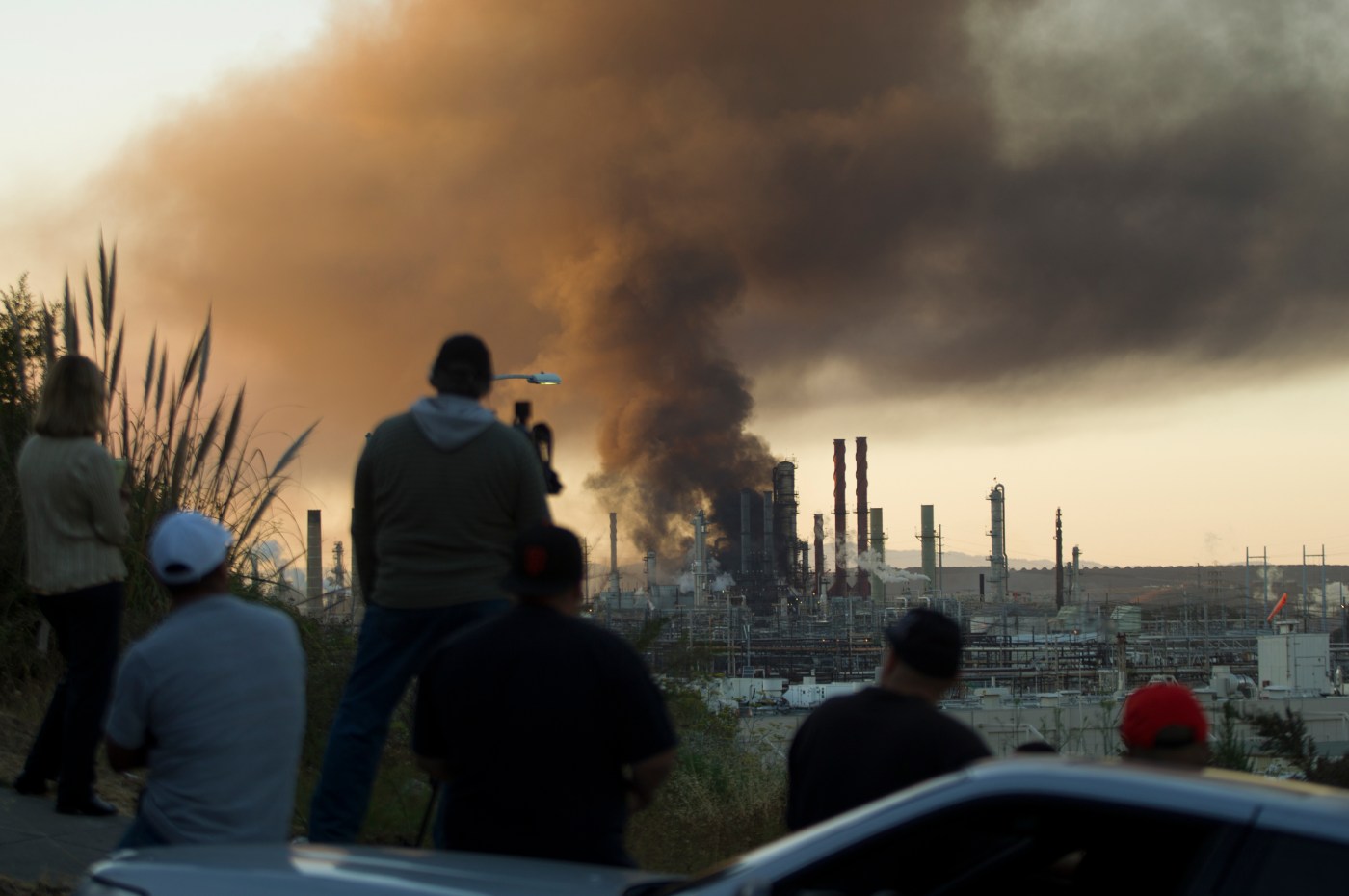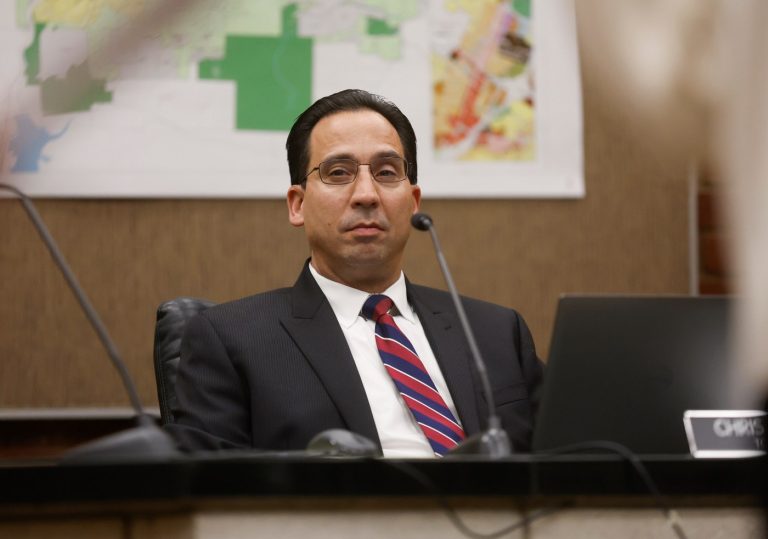MARTINEZ — Chronic issues with Contra Costa County’s Community Warning System (CWS) have sparked fears for years that alerts about wildfires, refinery incidents, earthquakes and other dangers will fail to keep residents safe.
While county leaders addressed some of those problems this week, what they didn’t acknowledge is that one elected official holds ultimate authority over that system’s operations — meaning any proposed fixes may fail to make any traction.
The Board of Supervisors on Tuesday agreed with a majority of the findings in an ominous June report by the Contra Costa County Civil Grand Jury, which found that only 30% of residents are enrolled in the CWS’ current voluntary opt-in system. The county was also criticized for failing to establish alert protocols to inform residents about less-impactful chemical releases, such as the flaring event last Thanksgiving that showered 24 tons of toxic, dusty residue on neighbors living near the Martinez Refining Company.
These concerns are paramount in Contra Costa County, which scores in the 99th percentile for both overall risk and financial loss due to natural hazards.
Responding to the grand jury report, the supervisors recommended that the county conduct a comprehensive study of its emergency management and disaster response function — including its planning, communication, public outreach and training efforts.
Related Articles
Avian botulism caused ducks to die at California park
Bee attack kills 2 horses, sends California father and son to hospital
San Jose mayor forms committee supporting passage of Prop 36
What to know about California’s earthquake early warning system, MyShake
Bicyclist survives 100-foot fall down Big Sur landslide, helicoptered to hospital
County staff said they will explore ways to streamline internal staff notification procedures, enhance training verification for first responders and analyze the feasibility of installing new Long Range Acoustic Devices (LRADs). Staff said specific studies and a more expansive plan will return for board consideration before the end of 2024.
However, county officials still defended many of its current practices, including the Sheriff’s Office’s decision to utilize on-call CWS employees and law enforcement heads to confirm and coordinate warning messages, rather than training emergency dispatchers to send out alerts. While dispatchers are authorized to handle alerts related to refineries and chemical plants, Contra Costa County is the only Bay Area county that does not train those same workers to operate the CWS during emergencies, according to a 2018 survey.
Julie Beach-Cavallero, the Community Warning System’s manager, and Tim Ewell, chief assistant county administrator, argued that there already are several redundancies in place to reach as many people as possible during a disaster, including “reverse 911” alert protocols, hazardous material sirens, social media posts, campaigns to enroll more residents within the existing CWS and contracts to access contact info from utility and telecom provider data.
Supervisor John Gioia said that the civil grand jury’s report and subsequent deadlines to implement a host of recommendations are “the best avenues we have” to study and expand the county’s CWS and other alert systems, particularly involving new ways to better protect low-income communities that may have limited access to cell phones and other emergency resources.
“My concern always is that every impacted resident needs to be notified of anything that causes an impact to their health or requires them to take action,” Gioia said in an interview Wednesday, referring to less critical incidents that lack mandated alerts, including refinery flaring. “I’ve seen the CWS in operation for a long time, and there’s been gaps.”
However, there’s still a chance that this direction from county staff may not have much sway.
In Contra Costa County, the CWS is ultimately controlled by Sheriff David Livingston, who is serving his fourth term since first being elected in 2010. While county officials can provide input through its Industrial Safety Ordinance/Community Warning System Ad Hoc Committee and Emergency Services Policy Board, decisions about operations and improvements are ultimately Livingston’s call.
Richmond City Councilmember Sohelia Bana said this governing structure — without many options for public input or criticism — is one of her biggest grievances that wasn’t addressed this week.
Bana, who founded the West Contra Costa Fire Safe Council in 2022, wrote a letter to the grand jury last year after fruitless attempts to contact the Sheriff’s Office about potential improvements to the CWS, many of which had previously been deemed too expensive, redundant or not worth the effort.
While she is pleased that county executives largely support efforts to improve emergency preparedness, Bana said she is disappointed that the supervisors did not ask — or even require — the Sheriff’s Office to provide more detailed information on how they internally test ongoing operations, respond to community complaints and plan for future improvements.
Specifically, she called out conflicting data about two evacuation drills the city of Richmond conducted in 2022 and 2023 that she said revealed half of the participants either did not receive alerts or were notified hours after the drill was complete.
The sheriff’s office, however, claims that CWS data show a 90% successful delivery rate for both drills — outright rejecting the grand jury’s findings that the county failed to verify, interrogate or study Richmond’s concerns.
Bana said that staff within the Sheriff’s Office “mocked her request” to schedule a meeting with the county’s top cop, which she hoped would help improve communication channels and ensure their current practices are up to snuff.
“It’s easier to make an appointment with God than with the sheriff,” Bana said in an interview Wednesday. “We are asking for transparency, but the Sheriff is not accountable, he’s not responsive — his office doesn’t care about public safety.”
Livingston and staff within the Sheriff’s Office did not respond to requests for comment.
Bana said she’s hopeful that she can continue to push for changes through the county’s standing ad hoc committee and policy board meetings, which provide forums about the CWS and other emergency services.
“My only hope is to push for more citizen advisory or oversight for this whole thing,” Bana said. “(The Sheriff’s Office doesn’t) get the significance or complex dimensions of the problem. I don’t think they understand the weight of this.”












